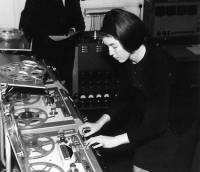The Importance of the Radiophonic Workshop to Electronic Music in the UK
Electronic music has infiltrated many music genres nowadays. From folk to classical via pop and dance music, music technology is now considered part of the mainstream musical cultures and markets.
This image is of a screencap from the documentary Doctor Who: Origins, it is intended for use in the article "Delia Derbyshire" to visually aid and provide critical commentary in describing the subject of the article. (Photo credit: Wikipedia)[/caption] There was a time however when electronic music was an interest of the few, and considered rather experimental and otherworldly. And early developments of the BBC Radiophonic Workshop helped to integrate music technology into radio, TV and music.
Documentaries and interviews that have been conducted about the Radiophonic Workshop elude to it being made of up of a small team of audio engineers and composers. We are often given the impression that they worked quite autonomously, providing sound effects, soundtracks and television and radio programme theme tunes. And they used quite creative and novel methods and approaches to do so.
Let's take the iconic Doctor Who theme tune for example. The score was composed by Ron Grainer and it was largely realised by Radiophonic workshop team member Delia Derbyshire, using very experimental musical techniques. She had no such thing as a multi-track mixing console or a sequencing software like we have today. She apparently used two or three reel to reel tape machines and synchronised them together to make the infamous melody. This is commendable enough, but then there each note was also carefully synthesised and she also used a lot of musique concrete measures ie. Found sounds.
This theme tune has been largely left intact almost 50 years later. The Radiophonic workshop team provided a number of ethereal, otherworldly and downright strange sound for the BBC from the 1960's and some of the members such as Delia Derbyshire and Daphne Oram were experimental electronic composers in their own right.
Cover of The BBC Radiophonic Workshop
This somewhat obscure element in the corridors of Broadcasting House must have had an influence as it was transmitted through people television screens and radios. So electronic music became a creative and possibly inexpensive method of providing sound design - huge orchestras were not needed and one person could make a variety of outcomes with only a few found sounds as the sounds could be manipulated in manifold ways if you knew how.
There seems to have been an increase of interest and attention paid to the careers and achievements of Radiophonic staff who produced both technically innovative and creative music. Delia Derbyshire seems to receiving more acknowledgement for her work at the BBC Radiophonic Workshop and she was making techno music in the 1960's.
And founder of the Radiophonic Workshop, Daphne Oram's amazing Oramics machine was the centre of an exhibition about the development of electronic music at the Science Museum in London. These early examples of women in electronic music have become icons in the history of technological music and are still often cited as influences for many electronic music makers today. Caro is a studio recording engineer, producer and performer of electronic music. She writes an electronic music blog covering these topics and interests including women in electronic music. Article Source: http://EzineArticles.com/?expert=Caro_Churchill



No comments:
Post a Comment